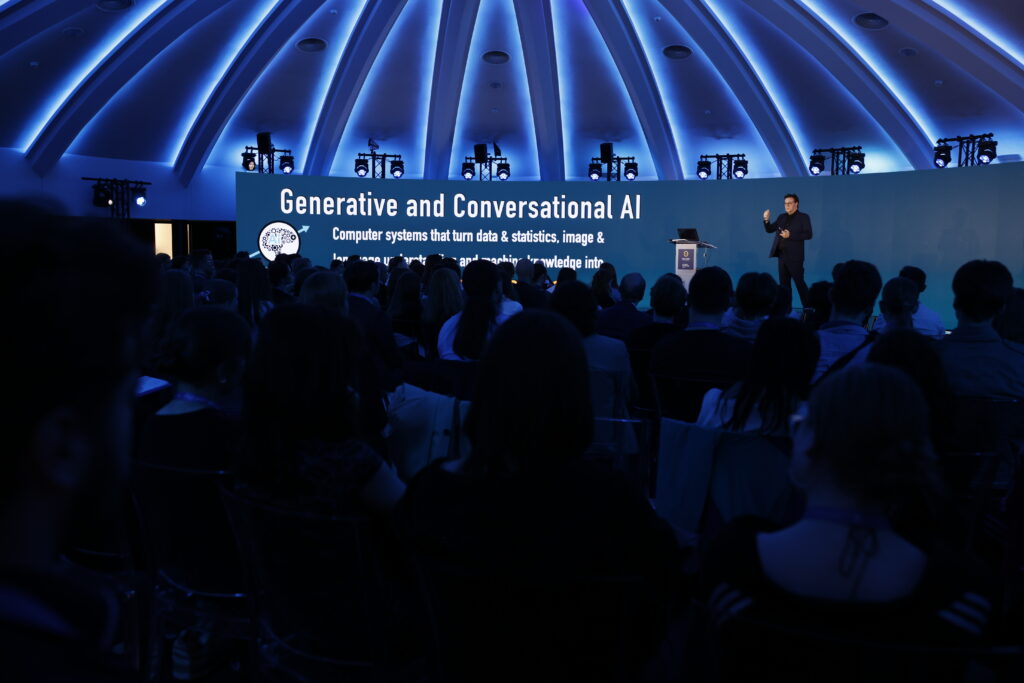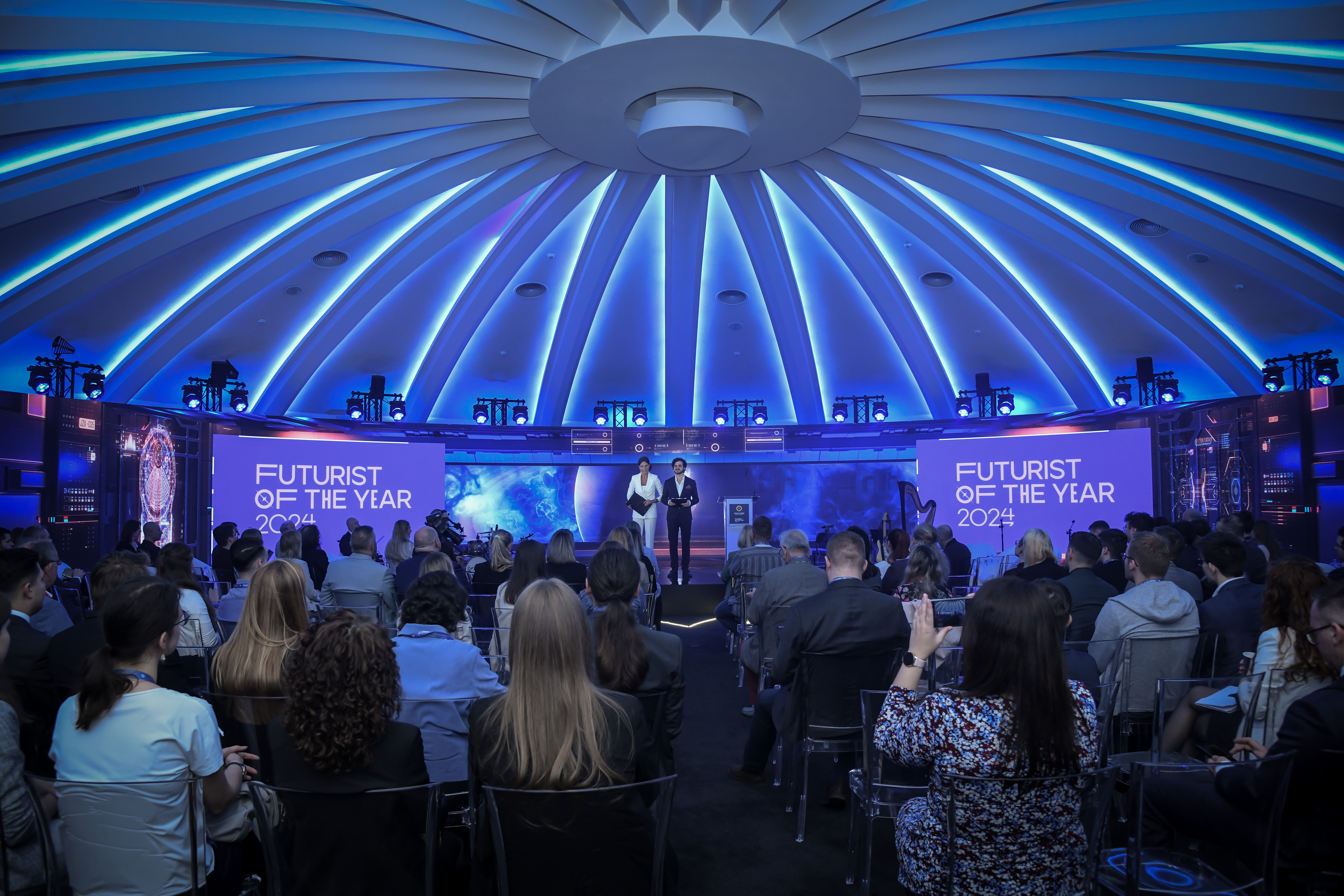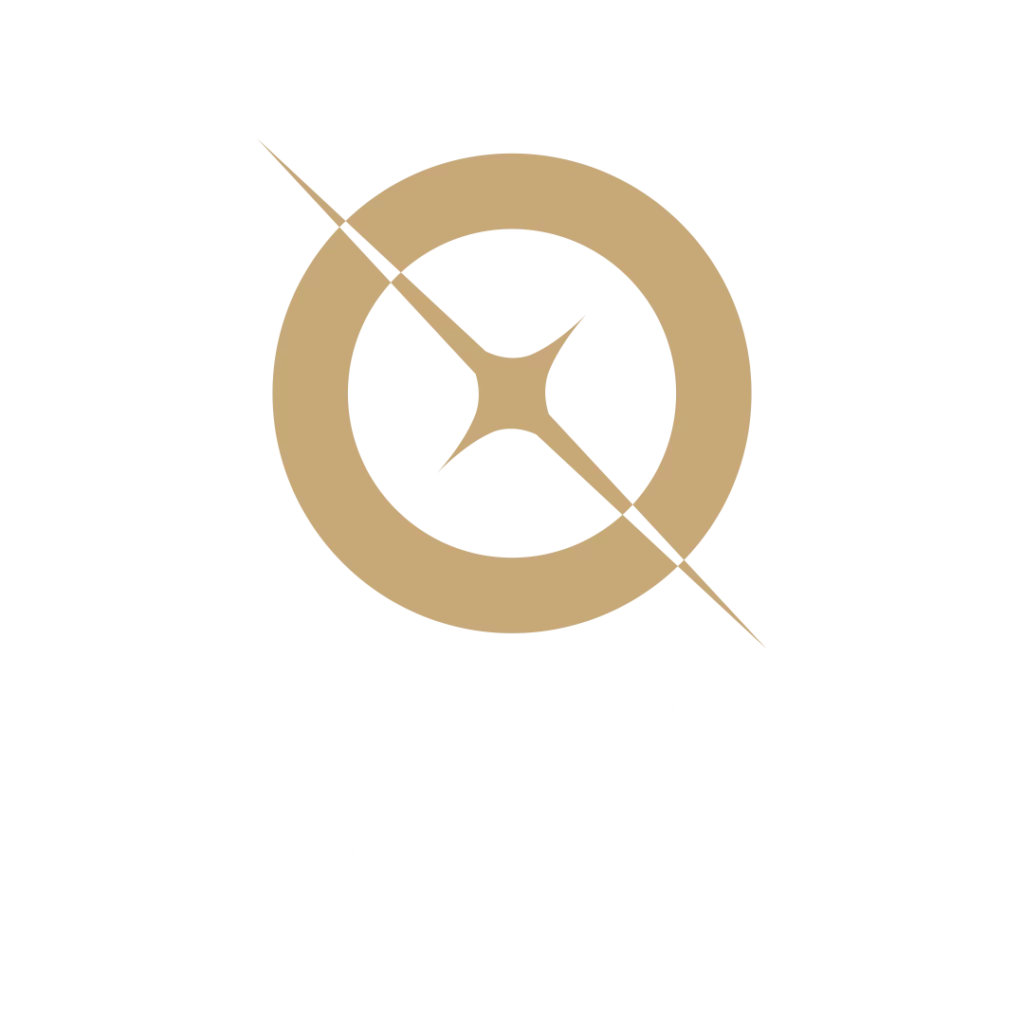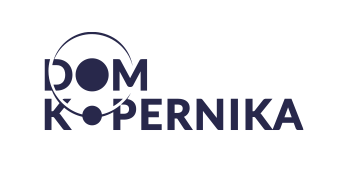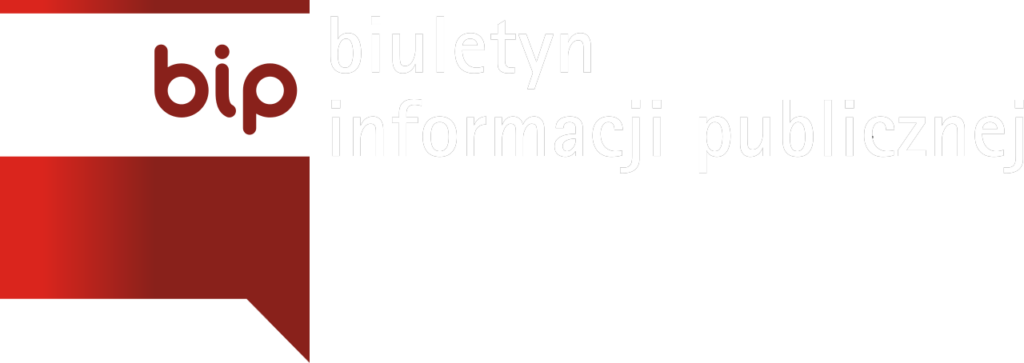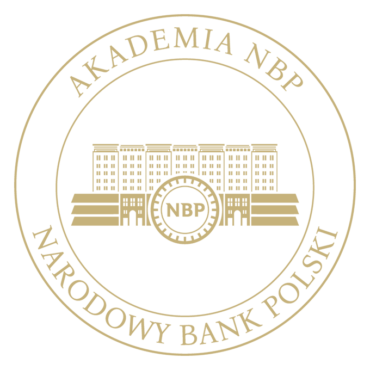SGMK – Nicolaus Copernicus Superior School is proud to announce the success of the first edition of the international, interdisciplinary science congress Futurist of The Year 2024. Lasting three days, SGMK – Nicolaus Copernicus Superior School’s celebration of science, the Futurist of The Year 2024 congress and its accompanying events – is Central Europe’s largest science congress focused on the future.
Organized for the first time by the SGMK – Nicolaus Copernicus Superior School with the support of partners and patrons, the #FOTY2024 Congress took place in Warsaw from April 9th to April 11th , 2024.
The Futurist of The Year science congress is an initiative creating an international and interdisciplinary space for debate on the future of technology, economics and education. Speakers at the congress included outstanding scientists, futurists and experts from the world’s top science and research centers. The congress was inaugurated with a lecture by Nobel laureate Prof. Didier Queloz entitled “The revolution of exoplanets in the footsteps of Copernicus.”
On the first day of the congress, the topics of the day concerned the future of technology, on the second day, the future of finance, and on the last day, the future of education and science. The congress was officially opened by Dr. Piotr Turek, Rector of the Nicolaus Copernicus Superior School.
FOTY2024 Congress in numbers:
29 speakers: A group of world-class scientists, including a Nobel laureate, who together have published more than 1,500 scientific articles and books and won more than 100 international awards.
More than 600 on-site participants
More than 25 hours of live streaming: Several thousand online viewers, which allowed for live global broadcast coverage of the congress events.
100 hours of talks, panels and discussions: Conducted in formal sessions and during coffee breaks and backstage meetings.
45 different thematic sessions: Organized over three days, including panel discussions, presentations and workshops that touched on key topics related to future of technology, finance, education and science.
15 panel discussions: Focused on the most current and pressing issues, with the participation of internationally renowned experts.
10 special lectures for SGMK students and doctoral students: Given by scientists, futurologists and specialists from the world’s most important science centers such as – Prof. Mariarosaria Taddeo, Prof. Mark Coeckelbergh, Jonathan Brill, Dr. Ousmène Jacques Mandeng, Dr. Michael L. Brodie, Gerd Leonhard, Thomas Frey, or Prof. Peter C. Bishop.
5 key workshops: Led by recognized thought leaders, that allowed participants to explore specific topics and skills.
Thousands of interactions: Each session generated numerous questions and comments both in the room and through online platforms, reflecting the high level of participants’ engagement.
Immeasurable moments of inspiration: Thousands of smiles and “aha” moments while exploring new ideas and solutions that will influence future research and development directions.
100% foreign speakers delighted to attend.
“The excellent reception of the congress by participants and speakers exceeded our wildest expectations. We gathered thinkers and visionaries who, in view of the rapid development of artificial intelligence and its potential impact on the world, emphasized how necessary such initiatives are today. The educational value of the collected footage is impressive, and the willingness expressed by the speakers to continue to collaborate and give lectures to our students opens new horizons for Polish education, creating extraordinary opportunities for development and networking. A central idea of our university from the beginning has been to ensure that students in Poland have direct access to the knowledge offered by professors from the world’s most renowned universities. We strive to have outstanding scholars come to us, eliminating the need for our students to travel abroad in search of quality education, and this congress has proven to be a great means to achieve this goal.” – Dr. Piotr Turek, Rector of Nicolaus Copernicus Superior School, said during his speech concluding the congress.
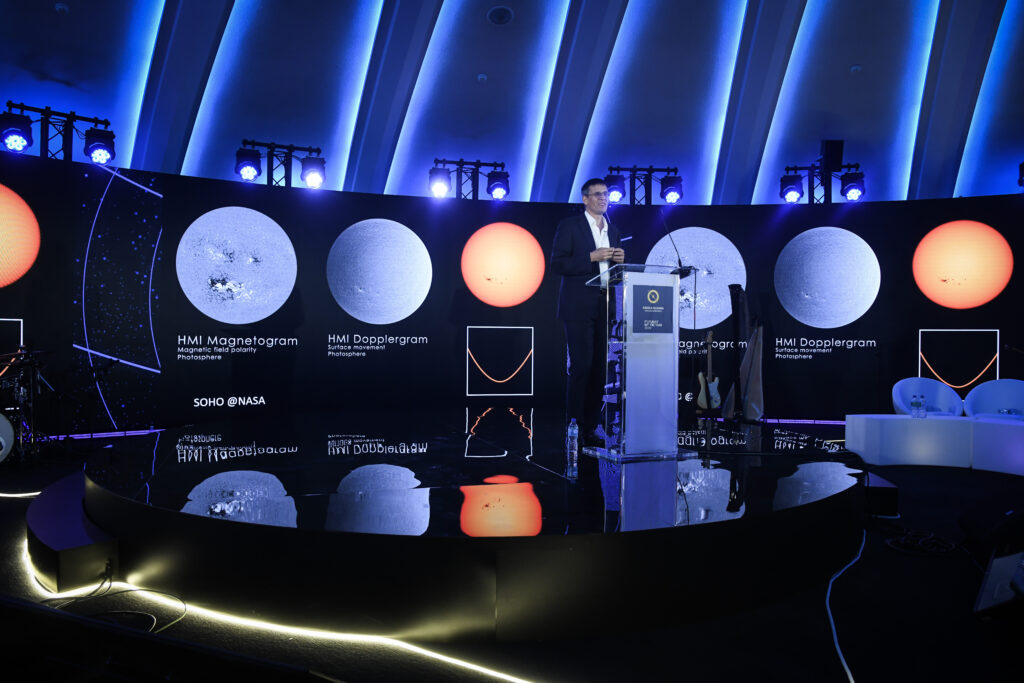
Cambridge, Harvard and Oxford scientists ON THE FUTURE OF TECHNOLOGY
| First day of the congress
On the first day of the congress, the debate revolved around technologies, in particular artificial intelligence and its impact on our future and functioning in the areas of business, universities, or the country as a whole. How to prepare for the era of AI-based automation, the ethics of artificial intelligence in Defense, the philosophy, power and limitations of data science or whether the future of artificial intelligence will be democratic – these were the topics discussed by the distinguished speakers. Among them were prominent scientists and experts in their fields from the most important science centers in the world:
prof. Didier Queloz (University of Cambridge and ETH Zurich),
| Jonathan Brill (Futurist), |
prof. John Tasioulas (Oxford University), | prof. Michael l. Brodie (Harvard University and M.I.T.), |
prof. Mariarosaria Taddeo (Oxford University and Alan Turing Institute), | dr Dorothea Baur (Baur Consulting), |
prof. Mark Coeckelbergh (University of Vienna), | prof. Nick Bostrom (Oxford University Future of Humanity Institute). |

2024 Futurist of The Year Award
The culmination of the first day of the congress was the “FUTURIST OF THE YEAR 2024” Competition Awards Ceremony. We met the winners: outstanding personalities, persons of merit who’s work impacts the future were awarded for their significant contributions and activities in particular disciplines in nine categories: Charity, Energy, Astronomy, Philosophy/Psychology, Technology, Cyber Security, Banking, Medicine, Economics.
The winners of the 2024 FUTURIST OF THE YEAR AWARDS were:
Futurist of The Year | ASTRONOMY – Maciej Mikołajewski, PhD.
Futurist of The Year | ECONOMY – Tomasz Biernacki
Futurist of The Year | BANKING – Prof. Paul Krugman
Futurist of The Year | MEDICINE – Beata Drzazga
Futurist of The Year | TECHNOLOGY – Michał Świerczewski
Futurist of The Year | PHILOSOPHY/PSYCHOLOGY – Dr. Jordan Peterson
Futurist of The Year | CYBERSECURITY – Jarosław Królewski.
Futurist of The Year | ENERGY – Wojciech Dąbrowski
Futurist of The Year | CHARITY – Rafał Brzoska and Omenaa Mensah
“I am very pleased that amongst the most outstanding laureates of the Futurist of The Year competition, the chapter decided to include and award our friend from the West, the eminent economist Paul Krugman, with whom I work at the City University of New York. Professor Krugman will come to Poland and will be at the same place where we are standing today. Thank you again.” – said Prof. Konrad Raczkowski of the City University of New York, who accepted the award on behalf of Prof. Paul Krugman and informed that Prof. Krugman, Nobel Prize winner in economics, will come in person to the SGMK – Nicolaus Copernicus Superior School later this year, in June.
The Competition Committee also decided to award SPECIAL AWARDS | Futurist of The Year 2024, to the following individuals: Prof. Didier Queloz, Jonathan Brill, Prof. John Tasioulas, Dr. Michael L. Brodie, Dr. Dorothea Baur, Prof. Mark Coeckelbergh, Dr. Ousmène Jacques Mandeng, Thomas Frey, Prof. Peter C Bishop.
The Futurist of The Year 2024 Competition Committee included the following distinguished personalities from the world of science: specialists, scientists and practitioners: Prof. Marios Loukas, Prof. Peter C. Bishop, Prof. Saša Horvat, Zofia Bugajna-Kasdepke, M.Sc. Nikola Bukowiecka, Agnieszka Kępińska-Sadowska, Grzegorz Piwnicki, Karol Sadaj, Łucja Woźnica, Anna Żywiołek, Philipp Eichholzer.
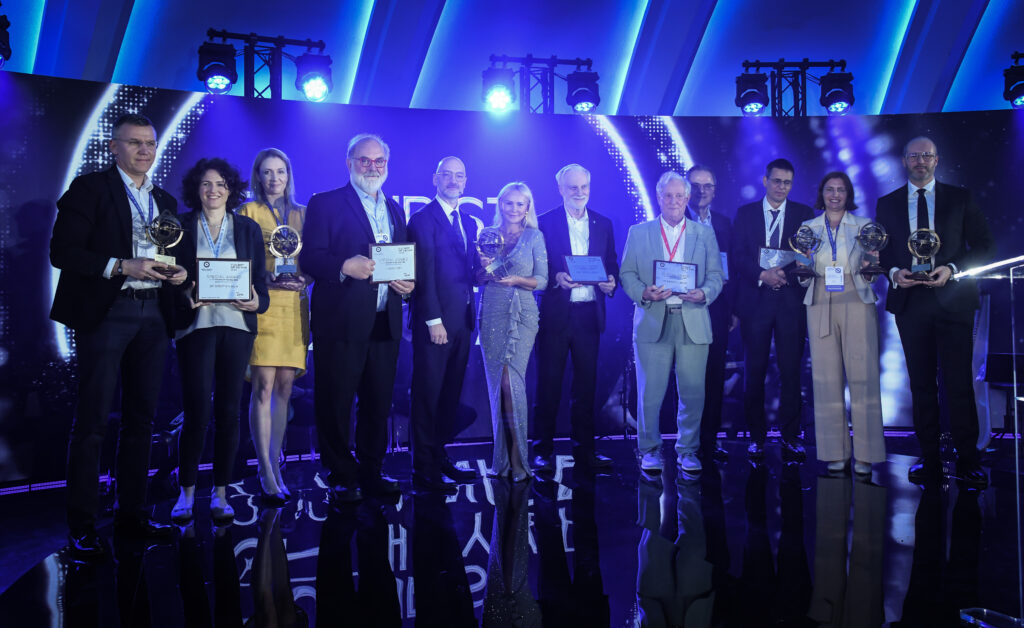
Researchers and experts from Harvard, Singularity University, Accenture, the Polish Bank Association and the National Bank of Poland ABOUT THE FUTURE OF FINANCE
| Second day of the congress
On the second day of the congress, the debate revolved around finance, banking, the digitalization of these areas and its impact on the future of finance in the face of new technologies, including artificial intelligence, as well as the impact on the future of our functioning in the areas of business, universities, or the country as a whole.
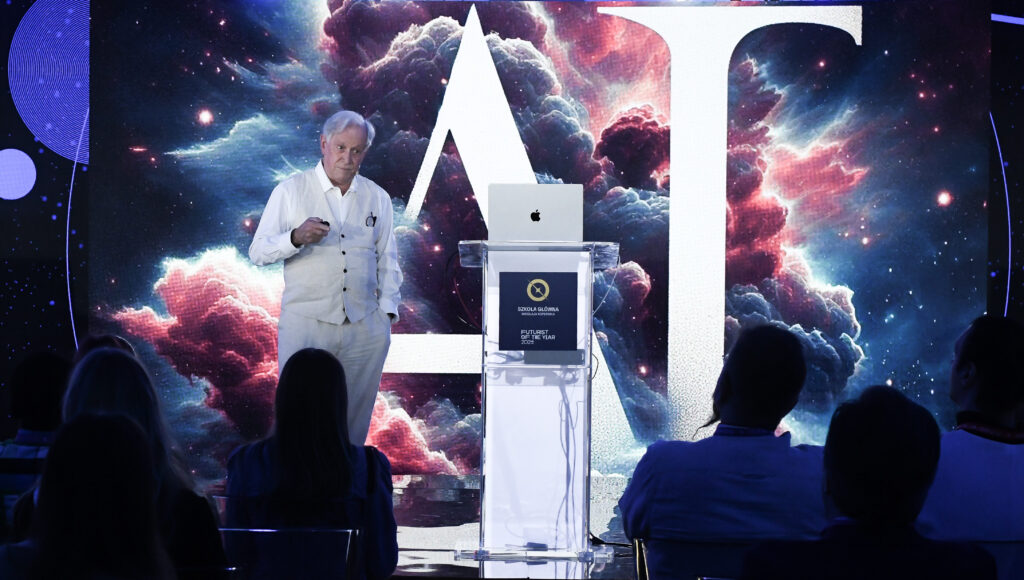
How new technologies and changing customer expectations are shaping the innovative products and services offered by commercial banks, whether most money is already digital, what is a problem-solving platform based on artificial intelligence, how we should create a trajectory for the future of the coming epochal changes, whether non-military warfare is the future or already the present, as well as predictions in central banking and what will be the joint future of finance and science – these were the topics discussed by our distinguished speakers. Among them were prominent scientists and experts in their fields from the most important scientific centers in the world and in Poland:
|
|
dr Ousmène Jacques Mandeng (Accenture i Harvard Review) | dr Tadeusz Białek (President of Polish Bank Association) |
Agnieszka Bochacka (Singularity University, PwC) | prof. Konrad Raczkowski (City University of New York) |
Gary A. Bolles (Singularity University) | gen. Cezary Janowski (Polish General Staff) |
dr Tomasz Pawlonka (Polish Bank Association) |
World’s leading futurologists and distinguished scientists ON THE FUTUREOF SCIENCE AND EDUCATION
| Third day of the congress
On the last day of the congress, the debate revolved around the future of education and science, including a discussion of what transformation of teaching and the labor market awaits us due to the emergence of new exponential technologies, such as artificial intelligence. What impact will these changes have on the functioning of business, science centers, the economy of the State?
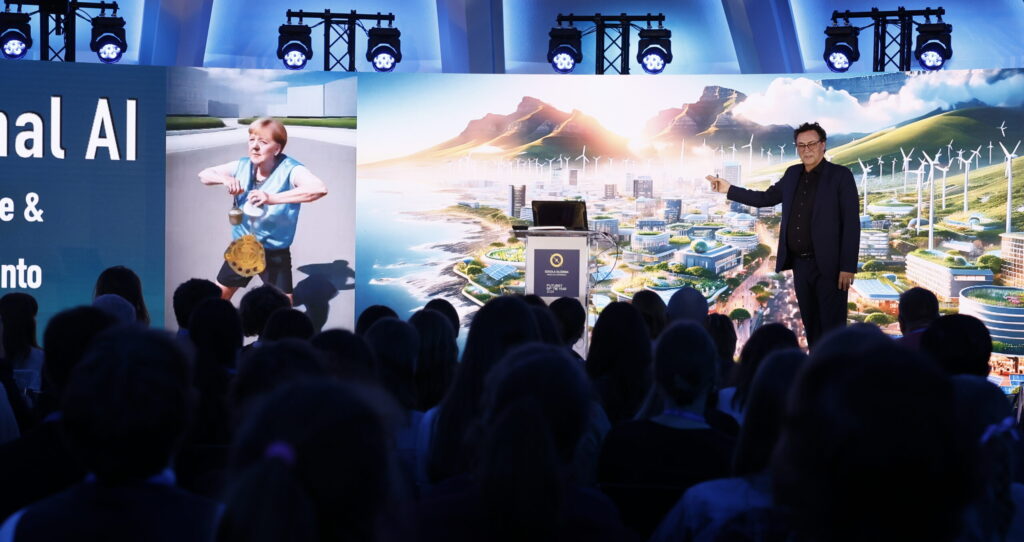
Are we facing a new concept of education and a real leap forward, different possibilities for financing science, public and private support for building university endowments and the future of higher education in a world of rapid digitization, what do futurology and education have in common, and whether AI will ultimately “eat us up” – these were the topics discussed by the speakers of the Futurist of The Year science congress.
Among them were world-renowned futurologists, prominent scientists and experts in their fields from major centers around the world and in Poland:
Gerd Leonhard (futurologist, one of the world’s best speakers) | Thomas Frey (futurist, ranked the best futurist in the world by Google) |
prof. dr hab. Krzysztof M. Górski (Copernicus Academy, NASA) | prof. Andrzej Dragan (University of Warsaw, National University of Singapore) |
dr Jakub Morze (SGMK’s youngest professor, Chalmers University of Technology) | dr Saša Horvat (University of Rijeka, SGMK) |
prof. Wesley Rosslyn-Smith (University of Pretoria) | Karolina Wilamowska (European LegalTech Association) |
prof. Grzegorz Górski (Jagiellonian College) | Nikola Bukowiecka (University of Rhode Island, Harvard i NASA) |
prof. Peter C. Bishop (futurist, professor of strategic foresight at the University of Houston) |
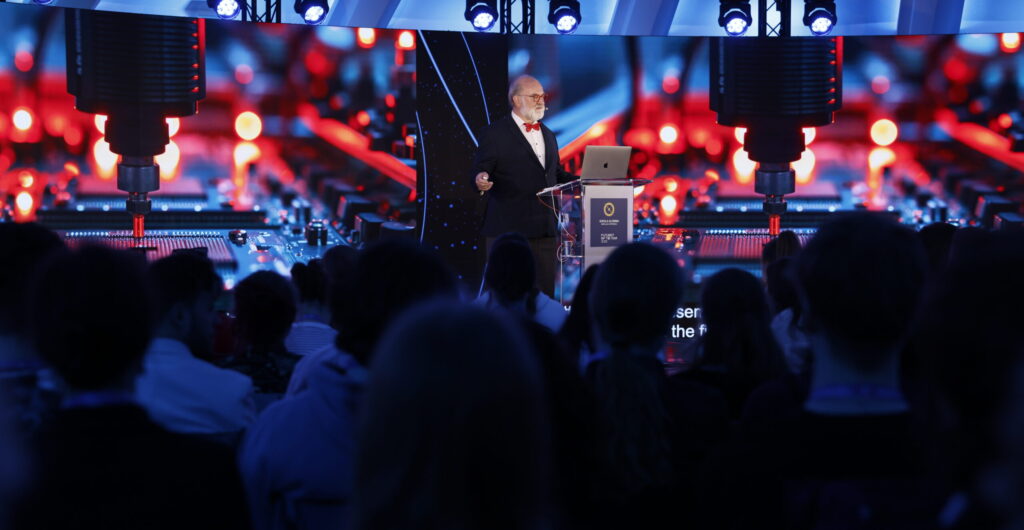
“Dom Kopernika” Competition Gala Awards Presentation
The culmination of the third day of the congress, and the last item on the agenda of the futurological science congress Futurist of The Year 2024, was the Gala Awards Ceremony of the “Dom Kopernika” competition finale. After the first stage of the competition for high school graduates, undergraduates and graduates, thirty people were awarded participation in the Futurist Of The Year 2024 science congress. Five participants took part in the final of the “Dom Kopernika” competition. From the five finalists, the competition committee selected two winners, who were awarded at the Awards Gala on the last day of the FOTY2024 congress. Our sincere congratulations!
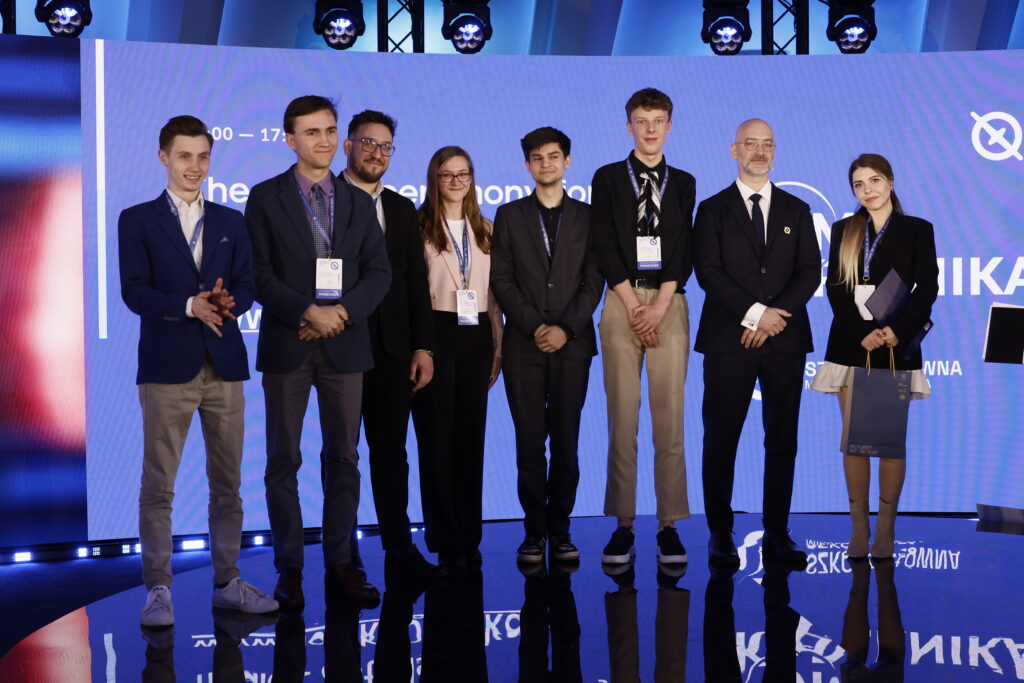
The Nicolaus Copernicus Superior School has also organized additional events accompanying the #FOTY2024 congress. The science conference “SGMK Colleges Debate” was held concurrently in four Copernican areas, i.e. the College of Astronomy and Natural Sciences, the College of Medical Sciences, the College of Philosophy and Theology, the College of Legal Sciences. For three days, the building of Nicolaus Copernicus Superior School hosted student activities with congress speakers, as well as the finals of the “Dom Kopernika” competition.
The Nicolaus Copernicus Superior School is a new academic center on the map of Central Europe that draws inspiration directly from the achievements of one of Poland’s most eminent scientists, Nicolaus Copernicus. Since its inception, SGMK has focused on high quality teaching, interdisciplinarity and internationality.
We invite you to read the conference materials and watch video report from the congress -> www.youtube.com/futuristoftheyear
For more information about congress go to: www.futuristoftheyear.com.
